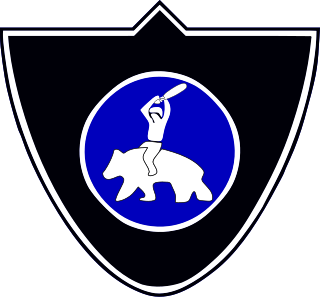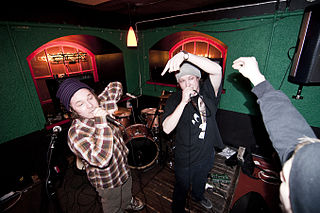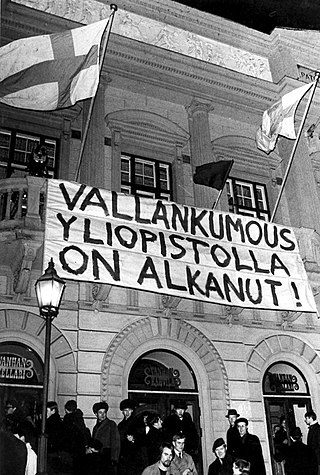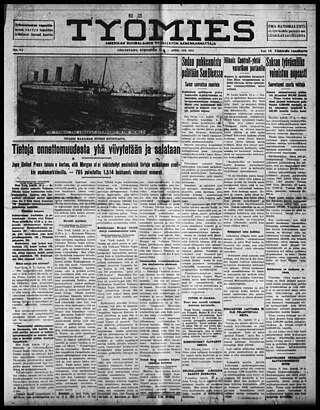
The history of Finland begins around 9,000 BC during the end of the last glacial period. Stone Age cultures were Kunda, Comb Ceramic, Corded Ware, Kiukainen, and Pöljä cultures. The Finnish Bronze Age started in approximately 1,500 BC and the Iron Age started in 500 BC and lasted until 1,300 AD. Finnish Iron Age cultures can be separated into Finnish proper, Tavastian and Karelian cultures. The earliest written sources mentioning Finland start to appear from the 12th century onwards when the Catholic Church started to gain a foothold in Southwest Finland.

Rolf Herman Nevanlinna was a Finnish mathematician who made significant contributions to complex analysis.

Soviet Empire is a political term which is used in Sovietology to describe the actions and power of the Soviet Union, with an emphasis on its dominant role in other countries.

Patriotic People's Movement was a Finnish nationalist and anti-communist political party. IKL was the successor of the previously banned Lapua Movement. It existed from 1932 to 1944 and had an ideology similar to its predecessor, except that IKL participated in elections with limited success.
Co-belligerence is the waging of a war in cooperation against a common enemy with or without a formal treaty of military alliance. Generally, the term is used for cases where no alliance exists. Likewise, allies may not become co-belligerents in a war if a casus foederis invoking the alliance has not arisen. Co-belligerents are defined in the Encyclopaedic Dictionary of International Law as "states engaged in a conflict with a common enemy, whether in alliance with each other or not".
Pinko is a pejorative coined in 1925 in the United States to describe a person regarded as being sympathetic to communism, though not necessarily a Communist Party member. It has since come to be used to describe anyone perceived to have radical leftist or socialist sympathies.

The New Statesman is a British political and cultural magazine published in London. Founded as a weekly review of politics and literature on 12 April 1913, it was at first connected with Sidney and Beatrice Webb and other leading members of the socialist Fabian Society, such as George Bernard Shaw, who was a founding director.

Finnish hip hop or rap or is a variant of hip hop music from Finland. The rapping (räppääminen) is mainly done in Finnish. Many rappers use Helsinki slang words; general slang and Finnish dialects are used too by some artists. Many early rappers used the English language. Some Finnish rap was already recorded in the early 1980s and some popular artists 1990s but it was not until the 2000s that it finally reached mainstream popularity.

The Academic Karelia Society was a Finnish nationalist and Finno-Ugric activist organization aiming at the growth and improvement of newly independent Finland, founded by academics and students of the University of Finland in 1922. Its members retained influential positions in the academic life of the era as well as within the officer corps of the Army. The AKS controlled the student union of the University of Helsinki from the mid-1920s right up to 1944, when the Society was disbanded in the aftermath of the Continuation War.
Lubor Jan Zink was a Czech-Canadian writer and columnist known for his anti-Communism.
The Student Union of the University of Turku is a body to which, under public law, all University of Turku bachelor's and master's degree students belong. It is among the oldest student unions in Finland. Postgraduate and exchange students may become a member of TYY, but it is not obligatory. Visiting are ineligible to join TYY.
Anti-communism is political and ideological opposition to communism. Organized anti-communism developed after the 1917 October Revolution in the Russian Empire, and it reached global dimensions during the Cold War, when the United States and the Soviet Union engaged in an intense rivalry. Anti-communism has been an element of movements which hold many different political positions, including conservatism, fascism, liberalism, nationalism, social democracy, libertarianism, and more rarely also anarchism, socialism, and Leftism. Anti-communism has also been expressed in philosophy, by several religious groups, and in literature. Some well-known proponents of anti-communism are former communists. Anti-communism has also been prominent among movements resisting communist governance.

The New Student House, originally named Osakuntatalo, is the current student house of the Student Union of the University of Helsinki, located in central Helsinki, Finland, at Mannerheimintie 5, right next to the Old Student House. It is part of the Kaivopiha building complex owned by the student union. The new student house houses the central office of the student union, the Ylioppilaslehti office, and premises for many nations and student organisations; part of the building has also been leased for third-party business and office use.

Vilho Annala was a Finnish civil servant, economist and far right politician.

Vilho Veikko Päiviö Helanen was a Finnish civil servant and politician.
War communism or military communism was the economic and political system that existed in Soviet Russia during the Russian Civil War from 1918 to 1921.

Fashion in the Soviet Union largely followed general trends of the Western world. However, the state's socialist ideology and surrounding regions culture influenced these trends.

A large group of University of Helsinki students occupied the Old Student House on November 25, 1968. The house was the designated location of the festivities for the Student Union's centennial celebration, scheduled the day after. The action was in protest at what they saw as a 1950s style "white tie party", and an uprising against the values which this stood for. The group entered by breaking in through a French window at 17:13 local time. The happenings immediately made nationwide headlines. The action has been seen as being inspired by the May 1968 unrest in France, and other political movements around Europe in the same year, including the Spring of Prague. In 2008, Laura Kolbe, a professor of European history at the University of Helsinki and also a member of the centrist, agrarian Centre Party, described the Vanha occupation as "the ripples of the European student movement in Finland".

Työmies was a politically radical Finnish-language newspaper published primarily out of Hancock, Michigan, and Superior, Wisconsin. Launched as a weekly in July 1903, the paper later went to daily frequency and was issued under its own name until its merger with the communist newspaper Eteenpäin (Forward) in 1950 to form Työmies-Eteenpäin.
Niilo Vilho Rauvala was a Finnish engineer and the chairman of the far-right Lalli Alliance of Finland and the Nazi Party of Finnish Labor in the 1930s and 1940s.












